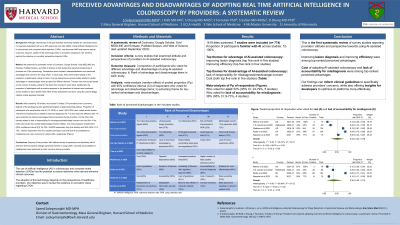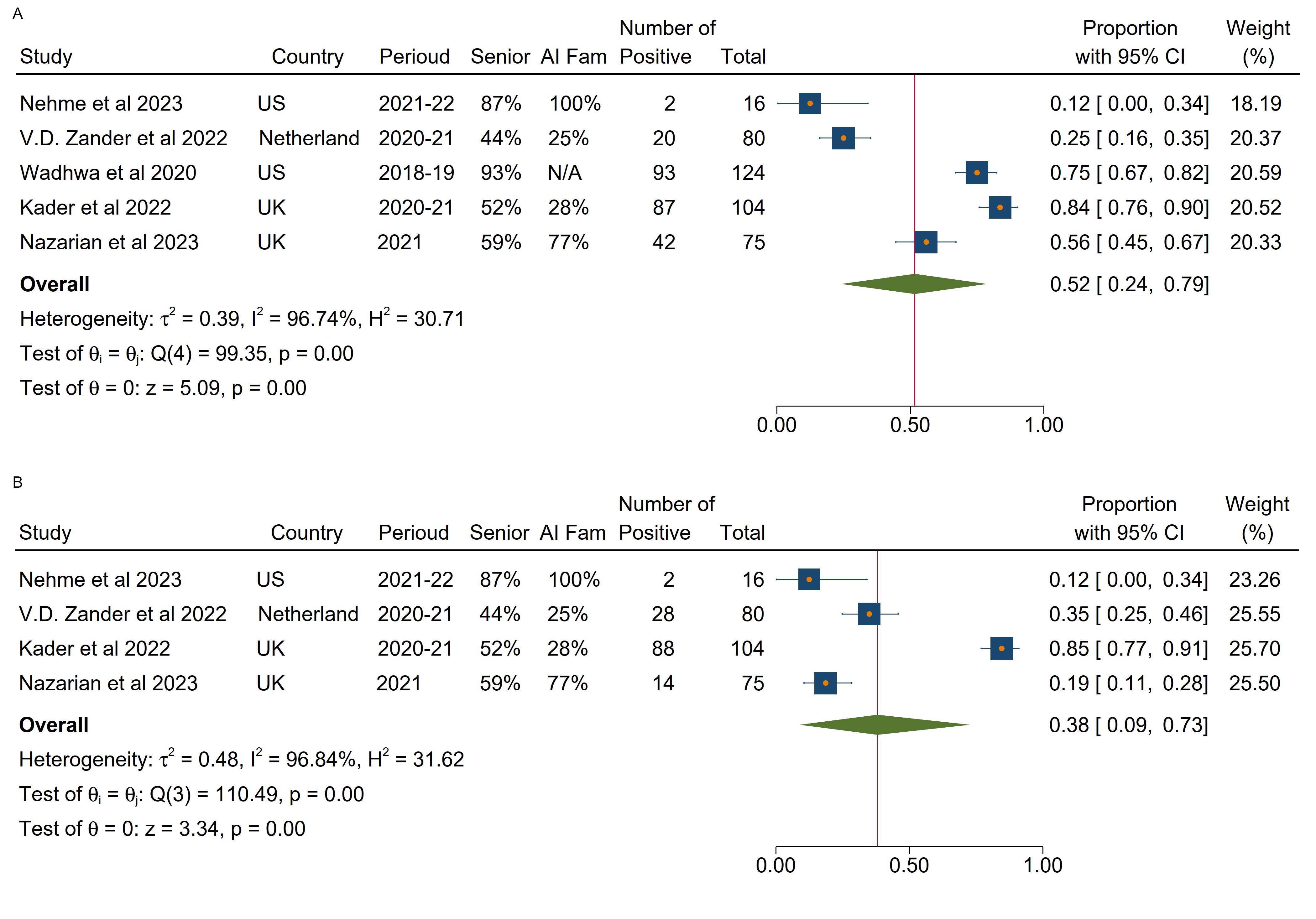Sunday Poster Session
Category: Colorectal Cancer Prevention
P0422 - Perceived Advantages and Disadvantages of Adopting Real Time Artificial Intelligence in Colonoscopy by Providers: A Systematic Review
Sunday, October 27, 2024
3:30 PM - 7:00 PM ET
Location: Exhibit Hall E

Has Audio

Saeed Soleymanjahi, MD, MPH
Yale New Haven Hospital
Boston, MA
Presenting Author(s)
Saeed Soleymanjahi, MD, MPH1, Jeniffer Kolb, MD, PhD2, Farid Foroutan, PhD3, Shahnaz Sultan, MD4, Dennis Shung, MD, PhD5
1Yale New Haven Hospital, Boston, MA; 2David Geffen School of Medicine at UCLA, Los Angeles, CA; 3McMaster University, Ontario, ON, Canada; 4University of Minnesota and Minneapolis VA Health Care System, Minneapolis, MN; 5Yale School of Medicine, New Haven, CT
Introduction: Although colonoscopy is the gold standard screening modality for colorectal cancer, it is operator-dependent with up to 26% adenoma miss rate (AMR). Using artificial intelligence (AI) in colonoscopy and computed aided detection (CADe), may decrease AMR and improve clinical outcomes; however, uptake of this technology relies on providers’ perspective. We aimed to explore the evidence on providers’ perspective towards CADe.
Methods: We performed a systematic review of Cochrane, Google Scholar, Ovid MEDLINE and Embase, PubMed Scopus, and Web of Science to find studies that reported perspectives of providers on AI for colonoscopy. Perspective items included: interest/satisfaction and perceived advantages and concerns for using CADe. In each study, we ranked items based on the proportion of participants voting for them. We grouped the five top-ranked items across studies related to similar advantages or disadvantages into themes. Themes were next sorted based on the number of studies voting for the items (Nv) included in each theme. Additionally, the proportion of participants with a positive response to the questions of interest were combined across studies to report pooled rates. Risk of bias assessment was done using the Joanna Briggs Institute critical appraisal checklist.
Results: After screening 1619 titles, we included 7 studies (774 providers) from 4 countries. Majority of the participants were gastroenterologists or gastroenterology fellows. Proportion of participants who were familiar with AI (12-100%) or used it (25-100%) were varied across studies. The themes including items related to improved diagnosis (Nv = 5) and improved efficiency (Nv =4) were sorted as top-ranked advantages themes perceived by the providers. On the other side, themes related to lack of responsibility for misdiagnosis/medicolegal concern and cost (Nv =5 for both) were sorted top-ranked disadvantages themes (Table). Our meta-analyses revealed 52% (95% confidence interval [CI]: 24-79%, 244/399 responders from five studies) and 38% (95% CI: 9-73%, 132/275 responders from four studies) perceived cost and lack of accountability for misdiagnosis as main concerns for using CADe, respectively (Figure).
Discussion: Majority of the providers with different levels of experience and familiarity with AI and from diverse practice settings expressed interest in using CADe. Cost and accountability for misdiagnosis were perceived as main concerns among providers.

Note: The table for this abstract can be viewed in the ePoster Gallery section of the ACG 2024 ePoster Site or in The American Journal of Gastroenterology's abstract supplement issue, both of which will be available starting October 27, 2024.
Disclosures:
Saeed Soleymanjahi, MD, MPH1, Jeniffer Kolb, MD, PhD2, Farid Foroutan, PhD3, Shahnaz Sultan, MD4, Dennis Shung, MD, PhD5. P0422 - Perceived Advantages and Disadvantages of Adopting Real Time Artificial Intelligence in Colonoscopy by Providers: A Systematic Review, ACG 2024 Annual Scientific Meeting Abstracts. Philadelphia, PA: American College of Gastroenterology.
1Yale New Haven Hospital, Boston, MA; 2David Geffen School of Medicine at UCLA, Los Angeles, CA; 3McMaster University, Ontario, ON, Canada; 4University of Minnesota and Minneapolis VA Health Care System, Minneapolis, MN; 5Yale School of Medicine, New Haven, CT
Introduction: Although colonoscopy is the gold standard screening modality for colorectal cancer, it is operator-dependent with up to 26% adenoma miss rate (AMR). Using artificial intelligence (AI) in colonoscopy and computed aided detection (CADe), may decrease AMR and improve clinical outcomes; however, uptake of this technology relies on providers’ perspective. We aimed to explore the evidence on providers’ perspective towards CADe.
Methods: We performed a systematic review of Cochrane, Google Scholar, Ovid MEDLINE and Embase, PubMed Scopus, and Web of Science to find studies that reported perspectives of providers on AI for colonoscopy. Perspective items included: interest/satisfaction and perceived advantages and concerns for using CADe. In each study, we ranked items based on the proportion of participants voting for them. We grouped the five top-ranked items across studies related to similar advantages or disadvantages into themes. Themes were next sorted based on the number of studies voting for the items (Nv) included in each theme. Additionally, the proportion of participants with a positive response to the questions of interest were combined across studies to report pooled rates. Risk of bias assessment was done using the Joanna Briggs Institute critical appraisal checklist.
Results: After screening 1619 titles, we included 7 studies (774 providers) from 4 countries. Majority of the participants were gastroenterologists or gastroenterology fellows. Proportion of participants who were familiar with AI (12-100%) or used it (25-100%) were varied across studies. The themes including items related to improved diagnosis (Nv = 5) and improved efficiency (Nv =4) were sorted as top-ranked advantages themes perceived by the providers. On the other side, themes related to lack of responsibility for misdiagnosis/medicolegal concern and cost (Nv =5 for both) were sorted top-ranked disadvantages themes (Table). Our meta-analyses revealed 52% (95% confidence interval [CI]: 24-79%, 244/399 responders from five studies) and 38% (95% CI: 9-73%, 132/275 responders from four studies) perceived cost and lack of accountability for misdiagnosis as main concerns for using CADe, respectively (Figure).
Discussion: Majority of the providers with different levels of experience and familiarity with AI and from diverse practice settings expressed interest in using CADe. Cost and accountability for misdiagnosis were perceived as main concerns among providers.

Figure: Metaanalysis of perceived disadvantages of using CADe: cost (A) and lack of responsibility for misdiagnosis (B)
Note: The table for this abstract can be viewed in the ePoster Gallery section of the ACG 2024 ePoster Site or in The American Journal of Gastroenterology's abstract supplement issue, both of which will be available starting October 27, 2024.
Disclosures:
Saeed Soleymanjahi indicated no relevant financial relationships.
Jeniffer Kolb indicated no relevant financial relationships.
Farid Foroutan indicated no relevant financial relationships.
Shahnaz Sultan indicated no relevant financial relationships.
Dennis Shung indicated no relevant financial relationships.
Saeed Soleymanjahi, MD, MPH1, Jeniffer Kolb, MD, PhD2, Farid Foroutan, PhD3, Shahnaz Sultan, MD4, Dennis Shung, MD, PhD5. P0422 - Perceived Advantages and Disadvantages of Adopting Real Time Artificial Intelligence in Colonoscopy by Providers: A Systematic Review, ACG 2024 Annual Scientific Meeting Abstracts. Philadelphia, PA: American College of Gastroenterology.
